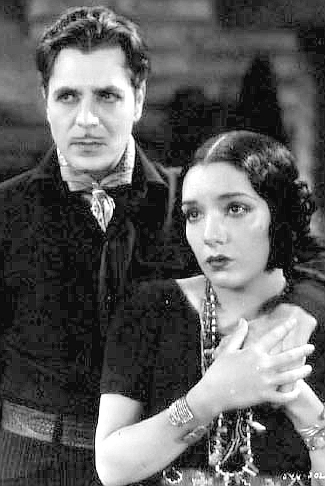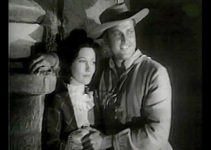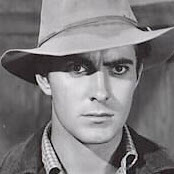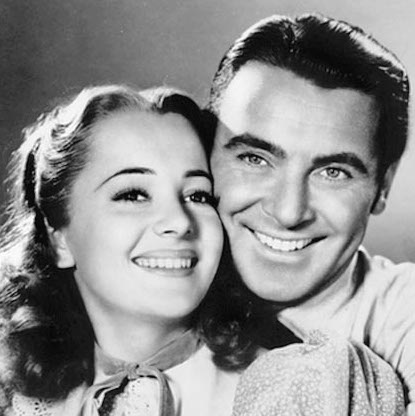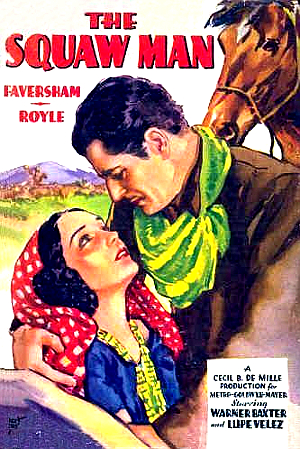 Warner Baxter is English gentleman Jim Wyngate, a man in love with Diana Kerhill (Eleanor Boardman), wife of his good friend Henry.
Warner Baxter is English gentleman Jim Wyngate, a man in love with Diana Kerhill (Eleanor Boardman), wife of his good friend Henry.
Diana begs him to leave England; he agrees. So when he discovers that Henry has embezzled money from an orphan’s fund to cover investment losses, Jim insists on taking the blame. After all, he’s leaving the country anyway.
He changes his name to Jim Carston and settles on a cattle ranch in Buzzards Pass, where he winds up in a feud with neighboring rancher Cash Hawkins (Charles Bickford). Hawkins wants Carston’s land as a gateway to smuggle booze and drugs from Arizona to Mexico.
One day, Hawkins shows up at the Maverick saloon for a showdown with Wyngate. Hawkins winds up dead, courtesy of a bullet from someone else’s gun; no one knows who fired by fatal shot.
On the way back to his ranch, Carston is ambushed by one of Hawkins men. He’s nursed back to health by an Indian girl named Naturich (Lupe Velez). She eventually becomes his lover; then the father of his son.
A moral dilemma comes when Carston learns that Lord Henry Kerhill has died and cleared his name in the process, leaving his beloved Diana a widow. She shows up at Buzzards Pass, hoping he’ll return to England.
Fans of Cecil B. DeMille films will likely find this slow-going. Certainly, it’s lacking his trademark epic action scenes.
But it’s still effective in spots. Such as when Naturich is drying off after refusing to be kicked out of Carston’s ranch. Such as when she presents a handmade horse as a gift to her son, who by that time is used to fancier trinkets, like a white man’s train set.
And the film delivers an ending that’s anything but Hollywood cliche.
This marked the third version of the film by DeMille. He’d made silent versions in 1914 (starring Dustin Farnum) and 1918 (starring Elliott Dexter).
Lupe Velez went on to become one of film’s most popular actresses from Mexico; she made seven films as the Mexican Spitfire from 1940 to 1943. Romantically linked to a number of stars and once married to Johnny Weissmuller, she committed suicide via drug overdose in 1944 at age 38. She was reportedly pregnant with actor Harald Maresch’s child at the time.
Cast:
Warner Baxter … Jim Wyngate / Carston
Lupe Velez … Naturich
Eleanor Boardman … Diana Kerhill
Charles Bickford … Cash Hawkins
Roland Young … John Applegate
Paul Cavanaugh … Henry, Earl of Kerhill
Raymond Hatton … Shorty
Dickie Moore … Little Hal Carston
Julia Faye … Mrs. Chichester Jones
DeWitt Jennings … Sheriff Bud Hardy
J. Farrell MacDonald … Big Bill
Mitchell Lewis … Tabywana
Victor Potel … Andy
Frank Rice … Grouchy
Eva Dennison … Dowager Lady Kerhill
Lilian Bond … Babs
Luke Cosgrave … Shanks
Frank Hagney … Deputy Clark
Lawrence Grant … Gen. Stafford
Harry Northrup … Meadows, the butler
Ed Brady … McSorley
Chris-Pin Marin … Spanish Pete
Runtime: 107 min.
Memorable lines:
Cash Hawkins: “For the second and last time, I come to offer to buy you out.”
Jim Carston: “My ranch is not for sale. And I’m not to be driven off it. The next friendly neighbor that comes across my land had better come fast and come shooting. Because there won’t be time for any jokes.”
Cash Hawkins, taking a look at Naturich: “And I thought it was his cattle I wanted .. You pay $6 for a skinny steer. Why wouldn’t I pay four bits for a nice brown, smooth-skinned heifer like this.”
Shorty, talking about Hawkins to his boss, Jim Carston: “He’s found out he can’t scare you off. And he can’t buy you off. So he’s going to bump you off. He’s going to have your ranch.”
Shorty: “You know, Hawkins is a dead shot.”
Jim Carston: “Can I depend on that?”
Jim Carston, about Naturich: “Hang the community. She’s nursed me and waited on me like a slave.”
Shorty: “Men don’t have slaves around here. Especially not pretty little brown ones. You don’t want them saying you’re a squaw man, do you?”
Jim Carston, on being urged to return to England: “Sorry, Johnny. We have today, maybe tomorrow. But never yesterday.”
Jim Carston: “Johnny, how can you explain the British Empire to a mind that hasn’t traveled past the trading post at Maverick?”

